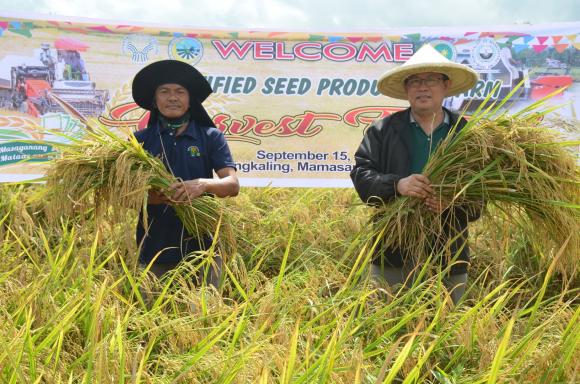BARMM's ‘palay’ yield up 36% in Q1 2021
COTABATO CITY – The Bangsamoro Autonomous Region in Muslim Mindanao (BARMM) has recorded a 36 percent increase in palay yield during the first quarter this year, the region’s Philippine Statistics Authority (PSA) reported Thursday.
PSA-BARMM Director Razulden Mangelen said their records indicated that the 36 percent growth in palay yield is equivalent to 310,012 metric tons, as compared to 196,987 metric tons logged last year.
Saudi Mangindra, chief of agriculture operations for the Ministry of Agriculture, Fisheries and Agrarian Reform (MAFAR)-Maguindanao, also affirmed the significant palay yield.
“This is a huge accomplishment for the reason that before, the region usually hit about a 3 to 5 percent increase in rice production," he said in an interview on Thursday.
Mangindra also acknowledged the significant contribution of the Philippine Rice Research Institute (PhilRice) office in Midsayap, North Cotabato to the BARMM’s agriculture sector.
He lauded the PhilRice assistance to Tuesday’s completion of 30 farmers from Maguindanao, province component of BARMM, of their four-month Farmers’ Field School (FFS) training organized by MAFAR and PhilRice-Midsayap.
In a separate interview, Ommal Abdulkadil, assistant director of PhilRice-Midsayap, said the agriculture sector remains resilient, as it continues to provide essential food supply amid the pandemic.
“We are helping the farmers to the best of our capability as there will be no food on our table if not for them,” Abdulkadil said.
He said Tuesday’s graduation of the farmers from Matanog, Barira, and Buldon towns of Maguindanao is the fifth among the series they have conducted for this year.
The participants underwent training on-field preparation, planting method, pest control, and identification of best performing varieties of seeds, among others.
Funded by the Capacity Development Project for Bangsamoro – Japan International Cooperation Agency - Philippines, the FFS also showcased demo sites where the farmers planted palay seeds applicable and suitable for the upland areas of the said towns.
Mangindra said the training also intends to help farmers change their traditional farming methods and adapt to science-based techniques to improve their rice yield.
“In Maguindanao alone, the majority of farmers are traditional growers. In the FFS program, we integrated the products of research, science, and technology for them,” he said.
Based on the participatory techno-demo farm they established, Mangindra said six kinds of palay seeds were used in the program that included the traditional Makasapi, Kiraban, Upland Dinorado, and the modern NSIC RC27, Dinorado Premium, and Sakilan varieties.
“For one, we have observed that the NSIC RC-27 can increase harvest up to four tons per hectare, as compared to the seed variety the local farmers previously used which ranges from 1.5 - 2 tons per hectare only,” Mangindra said.
He said MAFAR is continuously working with the PhilRice office on the conduct of more FFS training to sustain and secure food production in the region. (PNA)

